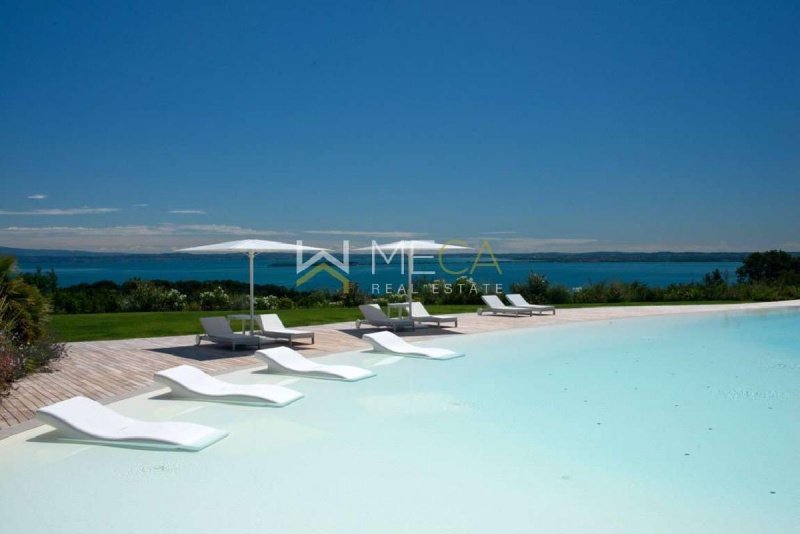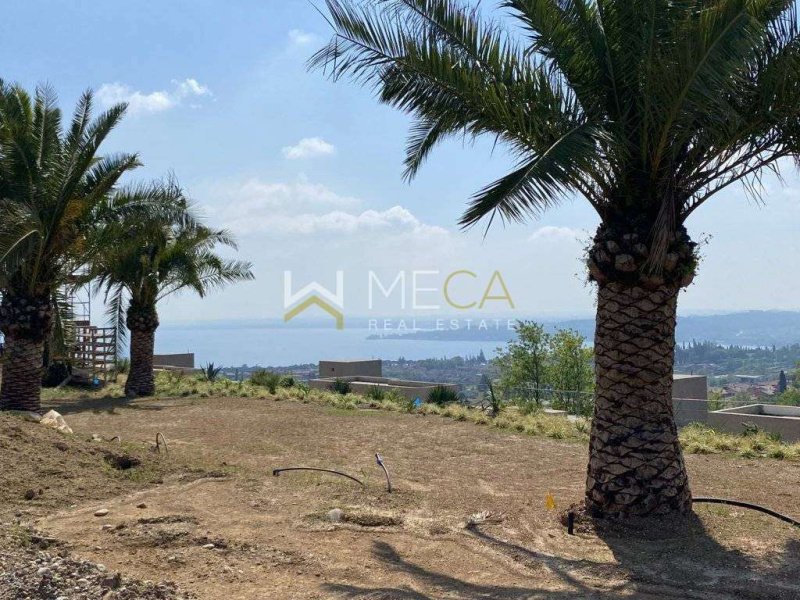Extra-luxury apartment with a panoramic view of the lake, unique in the Garda area, built with the finest materials, accessorized on request with top-level furniture and served by a modern and exceptional domotic system which serves the most varied needs and allows you to plan and give life to the apartment according to the owner's will ;
A vast swimming pool with tropical effects, counter-swim modality, soft-touch, also connected by a home automation system to the most varied settings, the possibility of making it a huge jacuzzi and creating incredible scenic effects with a click on your mobile;
Golf course, tennis courts, barbecue area served, children's play area, life track and much more.
Perimeter walls coated and last generation windows allow the internal temperature to be maintained.
Security guaranteed by high technology but completely manageable manually by the owner to ensure the safety in any situation;
Extraordinary and unique structure of its kind on Lake Garda.
Lake Garda
Lake Garda or Benaco is the largest Italian lake, with an area of about 370 km² (third by depth after Como and Maggiore). A hinge between three regions, Lombardy (province of Brescia), Veneto (province of Verona), Trentino-Alto Adige (province of Trento), it is parallel to the Adige, from which it is divided by the Monte Baldo massif. To the north it is narrow and funnel-shaped while to the south it widens, surrounded by moraine hills that make the landscape sweeter. The lake is an important tourist destination and is visited by millions of people every year. In Roman times the lake was known as Benacus and by some it was revered as god Benacus, the very personification of the lake, sometimes associated with the cult of the god Neptune. Today it is better known as Lake Garda, a toponym attested since the Middle Ages and of Germanic origin, deriving from that of the omonymous town on the Veronese shore of the lake, which, together with another famous locality of the lake, Gardone Riviera, and others less known, such as Gàrdola, Gardoncino, Gardoni, Guàrdola and Le Garde, testifies to the Germanic presence that goes from the sixth to the eighth century, in particular the Lombard one. The toponym Garda, with which the lake is already called in some documents of the eighth century, is the evolution of the Germanic word warda, or "guard place" or "place of observation". The classic toponym of the lake, or Benācus lacus (Benaco), is almost certainly of Celtic origin, thus preceding the Roman dominion, and should derive from bennacus, comparable with the Irish bennach, and would mean "horned", or from the many promontories. The translation "horned" is also interpreted in reference to the Sirmione peninsula.
自动翻译所用的语言
Appartamento quadrilocale extra-lusso con vista panoramica lago, contesto unico nella zona del Garda, costruito con i più pregiati materiali, accessoriato con mobili di altissimo livello e servito da un moderno ed eccezionale impianto domotica che copre le più svariate necessità e che consente di programmare e dare vita all'appartamento secondo i gusti del proprietario;
Piscina di 800 mq con effetti tropicali, nuoto controcorrente e materassino soft-touch, anch'essa collegata tramite impianto domotica ai più svariati settaggi, possibilità di farla diventare un'enorme jacuzzi e creare effetti scenici incredibili con un click;
Sono presenti campo golf, campi da tennis, sontuoso giardino, zona barbecue servita, area giochi bambini, percorso vita e molto altro.
Cappotto su tutti i muri perimetrali e serramenti ultima generazione consentono il mantenimento della temperatura interna.
Sicurezza garantita da altissima tecnologia ma completamente gestibile manualmente dal proprietario per evitare qualsiasi problema;
Straordinaria e unica struttura nel suo genere sul Garda.
Il lago di Garda
Il lago di Garda o Benaco è il maggiore lago italiano, con una superficie di circa 370 km² (terzo per profondità dopo Como e Maggiore). Cerniera fra tre regioni, Lombardia (provincia di Brescia), Veneto (provincia di Verona), Trentino-Alto Adige (provincia di Trento), è posto in parallelo all'Adige, da cui è diviso dal massiccio del monte Baldo. A settentrione si presenta stretto a imbuto mentre a meridione si allarga, circondato da colline moreniche che rendono più dolce il paesaggio. Il lago è un'importante meta turistica ed è visitato ogni anno da milioni di persone. In epoca romana il lago era conosciuto come Benacus e da alcuni era venerato come dio Benacus, personificazione stessa del lago, talvolta associata al culto del dio Nettuno. Oggi è meglio noto come lago di Garda, toponimo attestato fin dal Medioevo e di origine germanica, derivante da quello dell'omonima cittadina sulla sponda veronese del lago, la quale, insieme a un'altra località celebre del lago, Gardone Riviera, e altre meno conosciute, come Gàrdola, Gardoncino, Gardoni, Guàrdola e Le Garde, testimonia la presenza germanica che va dal VI all'VIII secolo, in particolare quella longobarda. Il toponimo Garda, con il quale è chiamato il lago già in alcuni documenti dell'VIII secolo, è l'evoluzione della voce germanica warda, ovvero "luogo di guardia" o "luogo di osservazione". Il toponimo classico del lago, ovvero Benācus lacus (Benaco), è quasi sicuramente di origine celtica, precedente quindi al dominio romano, e dovrebbe derivare da bennacus, confrontabile con l'irlandese bennach, e significherebbe "cornuto", ovvero dai molti promontori. La traduzione "cornuto" viene anche interpretata in riferimento alla penisola di Sirmione. La voce latina di Benaco è attestata come Benācus, -i e presuppone quindi un accento piano (Benàco): la versione italiana dell'accento tonico rimane fedele all'accentazione latina, quindi va pronunciato con l'accento sulla "a". Gli abitanti del lago, in particolar modo quelli della sponda veronese, pronunciano il nome Benaco con l'accento sulla "e", ovvero Bènaco. Resta oscuro il motivo per cui i nativi delle zone del lago tendono ad utilizzare la versione con l'accento sdrucciolo del nome.
CLASSE ENERGETICA: A 23,04 kWh/m2 a
Extra-Luxus-Wohnung mit Panoramablick auf den See, einzigartig im Gardasee-Gebiet, mit den besten Materialien gebaut, auf Wunsch mit hochwertigen Möbeln ausgestattet und von einem modernen und außergewöhnlichen Domotik-System bedient, das die unterschiedlichsten Bedürfnisse erfüllt und Ihnen ermöglicht die Wohnung nach dem Willen des Eigentümers zu planen und zu beleben;
Ein riesiges Schwimmbad mit tropischen Effekten, Gegenschwimmen, Soft-Touch, auch durch ein Hausautomationssystem mit den unterschiedlichsten Einstellungen verbunden, die Möglichkeit, ihn zu einem riesigen Whirlpool zu machen und unglaubliche szenische Effekte mit einem Klick auf Ihrem Handy zu erzeugen;
Golfplatz, Tennisplätze, Grillplatz bedient, Kinderspielplatz, Lifetrack und vieles mehr.
Beschichtete Außenwände und Fenster der neuesten Generation ermöglichen die Aufrechterhaltung der Innentemperatur.
Sicherheit durch High-Tech garantiert, aber vom Eigentümer vollständig manuell überschaubar, um die Sicherheit in jeder Situation zu gewährleisten;
Außergewöhnliches und einzigartiges Bauwerk seiner Art am Gardasee.
Gardasee
Der Gardasee oder Benaco ist der größte italienische See mit einer Fläche von etwa 370 km² (dritt nach Tiefe nach Como und Maggiore). Ein Scharnier zwischen drei Regionen, Lombardei (Provinz Brescia), Venetien (Provinz Verona), Trentino-Südtirol (Provinz Trient), parallel zur Etsch, von der es durch das Monte Baldo-Massiv geteilt wird. Im Norden ist es schmal und trichterförmig, während es im Süden breiter wird, umgeben von Moränenhügeln, die die Landschaft süßer machen. Der See ist ein wichtiges Touristenziel und wird jedes Jahr von Millionen von Menschen besucht. In der Römerzeit war der See als Benacus bekannt und wurde von einigen als Gott Benacus verehrt, die Personifikation des Sees, die manchmal mit dem Kult des Gottes Neptun in Verbindung gebracht wird. Heute ist er besser bekannt als Gardasee, ein seit dem Mittelalter bezeugter Ortsname germanischen Ursprungs, der sich von der gleichnamigen Stadt am Veroneser Ufer des Sees ableitet, die zusammen mit einer anderen berühmten Ortschaft des Sees, Gardone Riviera, und andere weniger bekannte, wie Gàrdola, Gardoncino, Gardoni, Guàrdola und Le Garde, zeugen von der germanischen Präsenz vom sechsten bis zum achten Jahrhundert, insbesondere der langobardischen. Der Ortsname Garda, mit dem der See bereits in einigen Dokumenten des 8. Jahrhunderts genannt wird, ist die Entwicklung des germanischen Wortes warda, oder „Wächterplatz“ oder „Beobachtungsplatz“. Der klassische Ortsname des Sees, oder Benācus lacus (Benaco), ist mit ziemlicher Sicherheit keltischen Ursprungs, geht also der römischen Herrschaft voraus und sollte sich von bennacus ableiten, vergleichbar mit dem irischen bennach, und würde "gehörnt" oder von den vielen bedeuten Vorgebirge. Die Übersetzung "gehörnt" wird auch in Bezug auf die Halbinsel Sirmione interpretiert.


